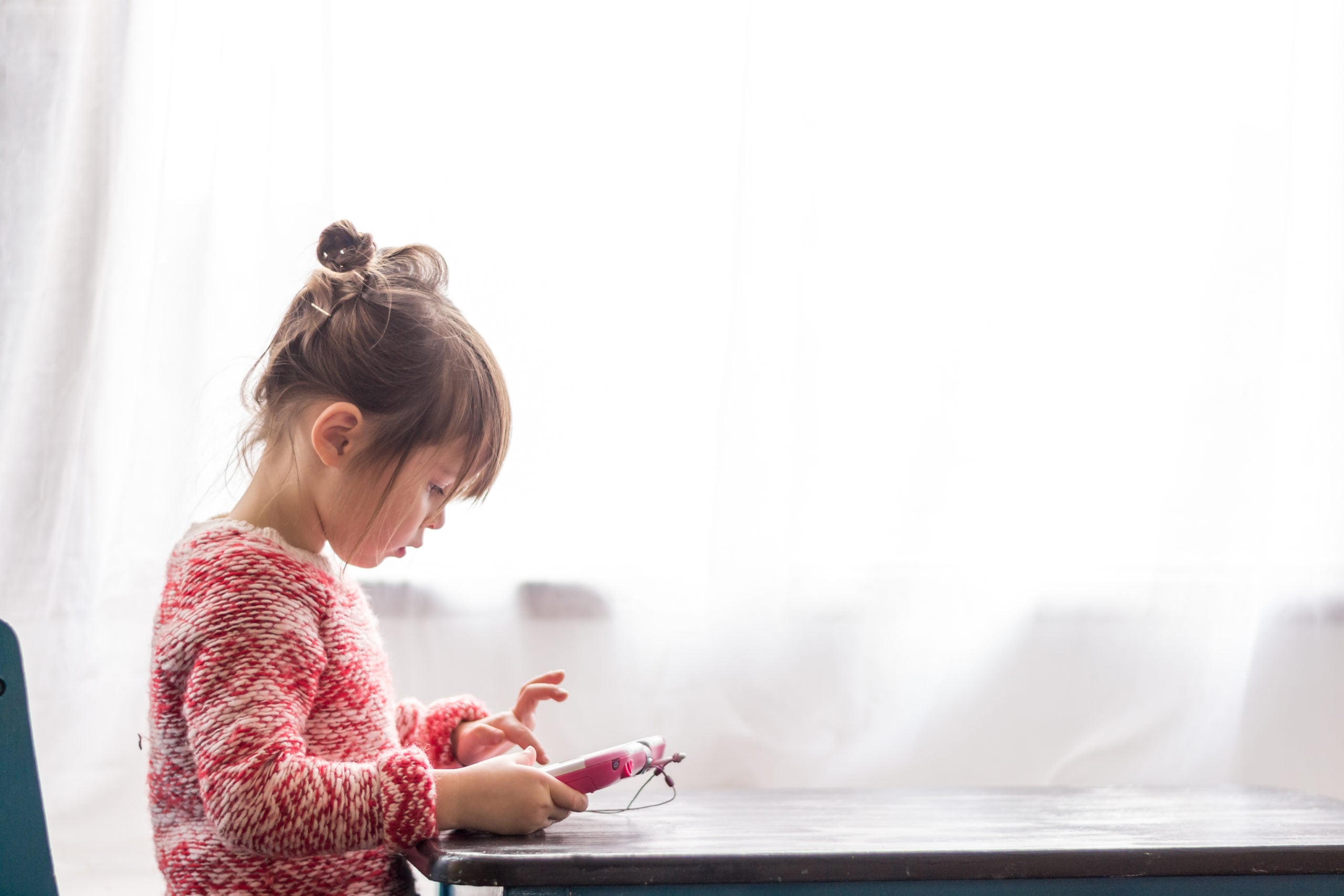In this article
- Should my child have screen time at daycare?
- How can I address daycare screen time rules without causing issues?
- Does the type of screen time make a difference?
- How much screen time should kids have each day?
- What should I do if my child’s daycare can’t accommodate my screen time requests?
- A final note on daycare screen time rules
The alphabet, songs, outdoor play — these are all activities that go hand-in-hand with daycare. But what about screen time? In today’s digital climate, screens are more prevalent than ever in early education environments (and in some cases, can aid with learning); however, many parents aren’t into the idea, and aren’t sure how to broach the subject with their child’s daycare center.
Although the conversation can feel awkward, it’s necessary, notes Yajaira Fulgencio, a licensed social worker and the behavioral health director at the IWS Children’s Clinic in Oak Park, Illinois. “It’s important for parents to build good communication with kid’s teachers and directors,” she says. “They should be open to asking hard questions and working together to find a solution.”
Feel like there’s a little too much screen time happening at your child’s daycare? Here’s how to address the issue.
Key takeaways
- Daycares should focus on play and learning, not screens, which can negatively impact development if overused.
- Limited, high-quality screen time may be acceptable for young kids, but it shouldn’t be the norm.
- Parents are encouraged to ask questions, share values and collaborate with staff around screen time rules and tech use.
Should my child have screen time at daycare?
Ultimately, no, kids shouldn’t be on screens when they’re at daycare, says Fulgencio.
Kids should be playing and learning at daycare, she explains, and the best way to do that is “by using books, interacting in class and making use of the available materials to learn.”
Additionally, screen time can have a negative effect on development, depending on how it’s used, notes Aimee Fearing, vice president of education at New Horizon Academy. “Research shows that excessive or passive screen use in early childhood can lead to reduced attention span and language development, increased sedentary behavior and disrupted sleep patterns.”
Also, as one parent bluntly put it on Reddit, parents aren’t “paying YouTube,” they’re paying the school.
How can I address daycare screen time rules without causing issues?
Here’s where things get a little tricky. What should you do if your views on screen time don’t align with the daycare’s? Ideally, Fulgencio notes, you’ll have addressed this on the front end during your initial visit.
“On your tour of the center, be sure to ask questions about how they fill their days and what tools they use before enrolling your child,” she notes. (Most centers have a media use policy, Fearing adds — ask to review it.)
All that being said, hindsight is always 20/20. If you didn’t get the screen time scoop before signing your child up for daycare, here are some steps to addressing the issue, per Fearing:
- Start with curiosity. Don’t go in hot. Instead, ask questions. Fearing suggests: “Can you tell me how screen time is used during the day?”
- Share your values. When you’re upfront about your personal values — instead of finger-pointing — it can make meeting eye-to-eye easier, Fearing notes. She suggests saying something like: “We’re trying to reduce screen exposure at home and want to align with what’s happening at daycare.”
- Collaborate. If screen time is used and you’re against it, Fearing suggests asking if your child can opt out or be offered alternative activities.
Does the type of screen time make a difference?
Yes. While screen time at day care should be kept to a strict minimum, quality does matter. “When used intentionally and sparingly, screens can support learning,” Fearing notes. “For example, interactive educational content or video chats with family members can enhance social and cognitive skills.”
Lisa Guernsey, author of the book “Tap, Click, Read: Growing Readers in the World of Screens,” notes that if and when kids have screen time, parents, caregivers and teachers should consider the Three C’s: content, context and the individual child.
In a daycare environment, she notes, screens shouldn’t be “relied upon to occupy young children.” Instead, Guernsey continues, “it should be high quality media that’s age appropriate, helps develop kids’ language skills and is co-viewed with educators.”
How much screen time should kids have each day?
In general, screen time should not take up a big chunk of any child’s day — and the younger the child, the less screen time they should have.
“There have been studies showing that children under 2 should not be exposed to any screen time,” notes Fulgencio. “That said, it can be hard to do this with how prevalent screens, phones and tablets are.”
Here’s what the American Academy of Child and Adolescent Psychiatry (AACAP) recommends when it comes to screen time and babies and toddlers:
- 18 months. Limit screen use to video chatting along with an adult (for example, with a parent who is out of town).
- 18-24-months. Screen time should be limited to watching educational programming with a parent or caregiver.
- 2-5 years old. Limit non-educational screen time to about 1 hour per weekday.
What should I do if my child’s daycare can’t accommodate my screen time requests?
If you’ve spoken to teachers about amending their class screen time rules and it’s not an option, Fulgencio recommends “communicating with upper administration” to see if they can help implement change. She also suggests talking with other parents to see if they’re having similar issues.
Beyond that, here’s what Fearing recommends:
- Reinforce healthy habits at home. Prioritize outdoor play, reading and family interaction.
- Explore alternatives. “If screen use is excessive and non-negotiable, consider another program,” Fearing suggests. “Look for centers that emphasize minimal screen exposure and active learning.”
- Get (and stay) involved. If there are opportunities for involvement with the center, seize them. to “Volunteer, observe or ask for updates to stay informed about your child’s daily experience,” Fearing says.
A final note on daycare screen time rules
It’s unlikely that any daycare center is going to align with each and every one of your family’s rules — and that’s OK. But if it’s something that’s important to you (and it’s at the expense of your child’s overall experience), speak up. “Parents should always stay in close communication with directors and teachers at their child’s daycare center,” says Fulgencio, as it makes a richer, more positive experience for everyone.





